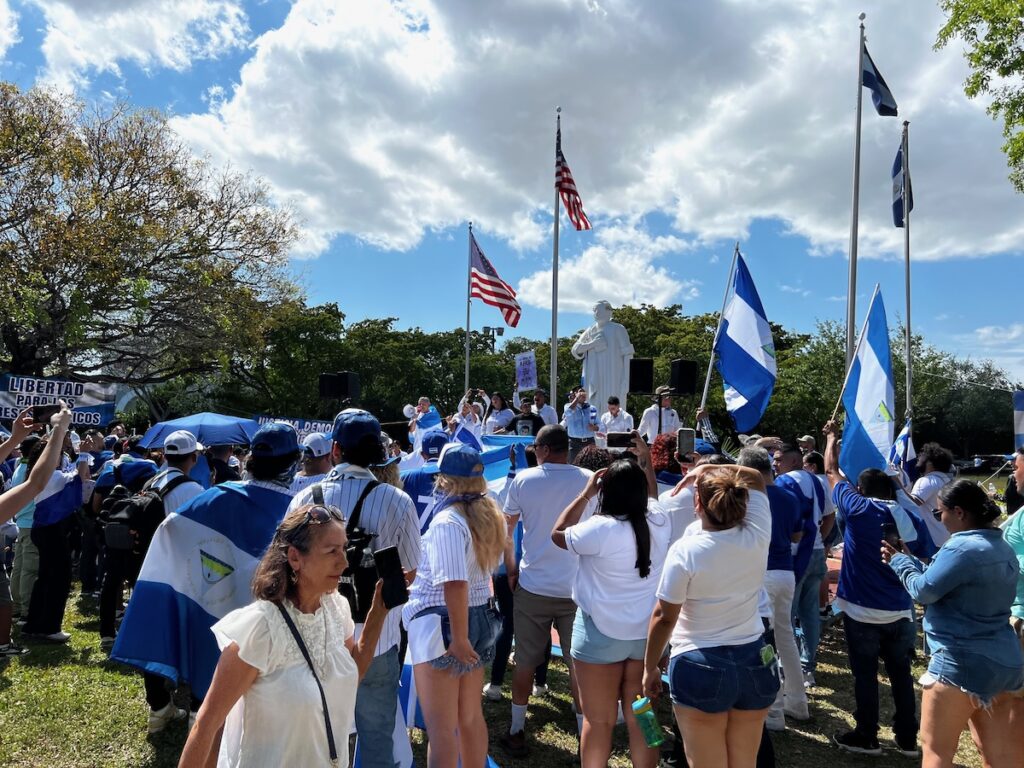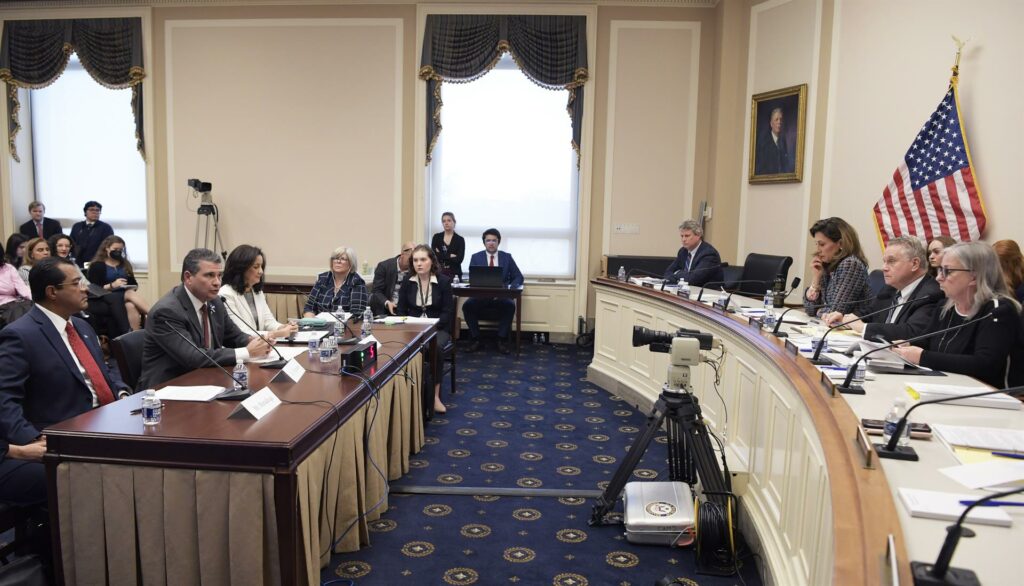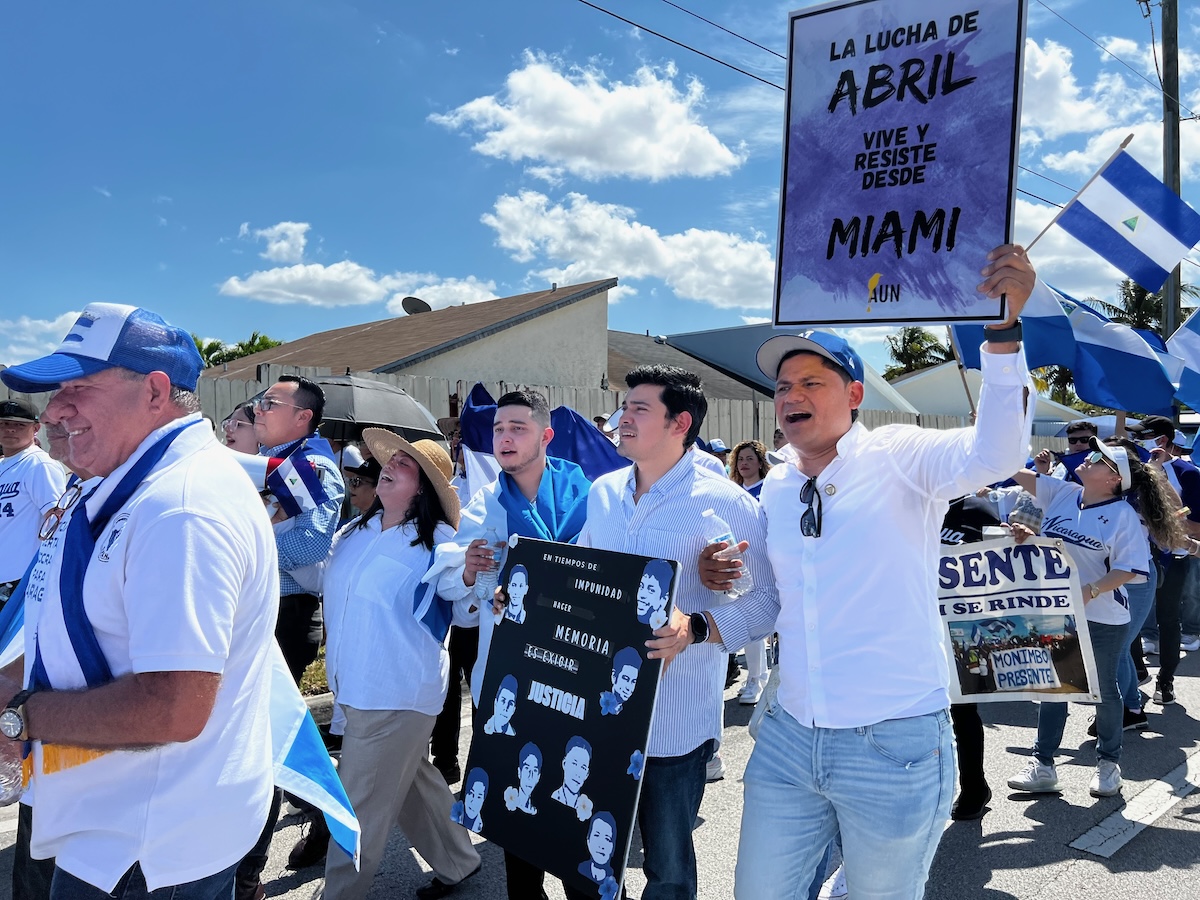Hundreds march along Flagler Street; some dance, others jump, shouting slogans against Daniel Ortega and Rosario Murillo. It’s a blue and white surge that concentrates on two of the three lanes of this main street in Sweetwater, the city in Miami with the highest concentration of Nicaraguans.
They march to commemorate the sixth anniversary of the April Rebellion. They do it with determination, regardless of the intensity of the sun scorching South Florida. They have Nicaraguan flags, waving the hope that the fall of the dictatorship could be “sooner rather than later.” A hope that, however, is restrained by the socio-political reality: the regime has managed to consolidate its power, nationally and internationally rearranging its pieces, and, in the end, there is a diverse and nourished opposition that—six years after 2018—fails to achieve the elusive goal of “unity.”
The hope for “unity” persists among exiles and the Nicaraguan diaspora converging on Flagler, an avenue that is also a center for Nicaraguan gastronomy. If one opens the door of any of the stores on this street, the smell of cheese, pinol, fried pork, rosquillas, pinolillo, and other delights of our country alleviate homesickness. After the Sunday mass presided over on April 21 by Father Marcos Somarriba at the Santa Agatha Church (where Bishop Silvio Báez has disappeared from the public eye), hundreds of Nicaraguans headed towards Flagler on foot and in cars. They walked about two miles, until they reached Rubén Darío Park where, with the book Azul on his chest, a statue of our modernist poet lies.
The march, they assure, was convened by the Miami exile and diaspora. A hardline opposition bloc, positioned far to the right, too much at times, which origin lies in the first wave of Somoza supporters who fled when the Sandinista Revolution overthrew the dynasty in 1979.
Recibe nuestro boletín semanal
Some call it “the Miami barricade,” referring to the barricades that citizens raised in Nicaragua during the 2018 protests. It is a group quite politically hostile, many agree: they are not characterized by building bridges with those who think differently, and their logic stems from a very “biased” historical view. From this position arises—and remains—a strong ideological controversy that they fuel, and that has significantly affected the convergence among opposition groups of all kinds.
For the Miami barricade, anything “smelling of leftism” must be exterminated… despite the fact that the Ortega-Murillo repression has made no ideological distinctions. It has equally destroyed everyone, whether they are right-wing, left-wing, Catholics, civil society, feminists, believers, human rights defenders, political parties, peasants, businessmen… In short, the whole range of victims burdened by a regime accused of committing crimes against humanity since April 2018, when they killed more than 350 people.
The event in Miami was presided over by the young members of the Nicaraguan University Alliance (AUN). Lesther Alemán, whose life changed when he confronted Ortega in the National Dialogue, gave the keynote speech at the end of the march. Wearing a Panama hat to protect himself from the sun (which gives him the appearance of an old politician rather than that lanky young man with thick glasses from 2018), Alemán acknowledged the opposition’s “mistakes” in his speech. However, he did not delve into them, such as when the opposition in 2021 split into two blocks, preventing a unified candidacy to confront the Ortega-Murillo regime in the presidential elections.
“There have been mistakes made, and we have recognized them. The conviction of Nicaraguans is greater, and that is our commitment to those who cannot protest today. There is a need for leadership; do not be afraid of that!” Alemán said in the park. “There is a country waiting for us.”
AUN members were on the side of the Citizens for Freedom (CxL) party in 2021 and were among the most vehement critics of the candidates from the National Coalition. In the end, when they understood the unequivocal call for unity from the citizens, the two blocks reluctantly tried to unite. But it was too late, Ortega and Murillo decided to send them all—with no distinction—to El Chipote prison.
They were all exiled, confiscated, and denationalized—with no distinction—in February 2023. Their arrival in the United States raised hope. The terrible ordeal through the prisons, in a way, politically matured them. That was thought, that was also what they said. Many talked about unity without delay, but as the popular saying goes, there is a long way from words to actions.
More than a year after the exile, unity remains on hold where, once again, political differences persist. Many hug for public photos, but then attack each other in their own spaces.
This, for example, was made clear with Félix Maradiaga’s leaked audios, in which he ranted against his fellow opposition members. Such distrusts for that longing for unity which precedent is the National Opposition Union (UNO) from 1990.
Archipelago with no boats

Several attendees at the Miami march shouted “unity, unity, unity!” during Lesther Alemán’s speech. A cry that was briefly paid attention to. Seeing the hope of the exile and diaspora in Rubén Darío Park—all these people longing to return to Nicaragua, moved singing the national anthem—I wondered how it was not possible to coordinate a single opposition coalition against such a clear enemy for all of them: the Ortega-Murillo dictatorship.
Truly, as a journalist, I don’t have the answer. I got distracted from the university leader’s speech and stopped to look at Darío’s statue (which, by the way, does not live up to the beauty that the poet always sought). I remembered a passage from Contemporary Spain, a book in which the poet criticizes Spanish politicians for not doing more to restore the country after the Spanish-American War, which left the peninsula in poverty. It’s a very different context, but in terms of attitudes, it resembles this situation… Darío wrote: “the politicians of the day seem to be unaware of the damage suffered, and they exhaust their energies in internal squabbles, battles of isolated groups, in partial matters of parties, without worrying about the common fate, without seeking the remedy to the general harm, to the nation’s wounds.“
I don’t know if this is the case for the Nicaraguan opposition because everyone recognizes the victims of April, of which they are also part. The irreparable damage that the dictatorship has inflicted on Nicaragua. However, there is a general weariness among citizens towards their contradictions.
All the political capital that emerged after April 2018, from new leadership to existing ones, has been squandered. The opposition and the diaspora are a “250 acronyms archipelago,” Manuel Orozco, an Inter-American Dialogue political specialist, tells me. I think it’s more like an archipelago with no boats—or with few willing to sail between islets to understand each other without suspicion or trickery.
“They compete for issuing statements rather than for political action,” Orozco continues, also denationalized. “It is a movement that is kidnapped by political reductionism and a terrible historical revenge of a minority that shouts. They reduce alliances to non-existent ideologies and claim revenge against an unfinished history. Meanwhile, Nicaraguans are not looking at what happened 40 years ago, like it or not. They are looking at the present, and politically, what they are clear about is democracy and no repetition, but they are not talking about right-wing democracy and revenge.”
After the exile of the 222 political prisoners, the most credible opposition bloc that has emerged is Monteverde, “a democratic conciliation” that has been attacked by right-wingers for being “full of leftists.” Something, it must be said, is untrue when looking at the platform composition.
However, Monteverde has also become tiring, and its statements have no major political action or impact. They are experiencing the worst thing that can happen to a political organization that aspires to become an alternative for change: irrelevance. The challenge for the opposition is enormous, especially when territorial organization in Nicaragua is nullified by brutal political persecution.
Former deputy and political exile, Eliseo Núñez, is part of Monteverde. When asked about the challenges of a persecuted and divided opposition, he resorts to “self-criticism”: “It is an opposition of personalities and empty of organic structures (…) and it has not been understood that the key is to organize. Some continue to operate from stages and, at certain times, offer magical solutions. Then the few organizations that exist are attacked because they are too left-wing or too right-wing. The opposition in Nicaragua has a hard time because you don’t have a base to build on, unlike Venezuela, where political parties still have some capacity. In Nicaragua, even before 2018, political parties had no capacity.”
Núñez insists on that idea: that the regime dismantled any capacity to oppose it before 2018. First, it allied with businessmen, destroyed institutions, and tied the political parties. That limited the leadership that emerged from the April protests.
“There is a phrase that says it is easier to get angry than to organize. That’s what fits here: in ’18 there was a lot of frustration, a lot of anger, but very little organizational capacity. The leaders that emerged did not have enough strength to push it. But again I say: that is not the fault of the leadership that emerged at that time, but no leadership had anything to fall on, there was nothing… not a party with a structure and a sufficient influence to generate adequate leadership. There were political parties, but all were already weakened by 2018,” Núñez insists.
International Community’s lack of interest

Diplomatic sources consulted agree that the international community has lost faith in the Nicaraguan opposition. After six years, they have not managed to formulate a clear block against the dictatorship, and more worryingly, they have not managed to establish themselves as an “alternative for Nicaraguans.”
That is, if tomorrow there were to be any political event in Nicaragua that implies a transition or credible elections, the opposition would not be organized to face it. However, the sources do not rule out the “imponderables,” meaning that in such exceptional circumstances, leaderships often emerge, but it is “up to fate”. “What leadership remains in Nicaragua? Who are the ones inside Nicaragua? Do we know who can emerge from within or will emerge in exile? We don’t know,” said a diplomatic source.
Another problem is that the Nicaraguan crisis is increasingly falling out of the priorities of the international community. There are many open conflicts, from the invasion of Russia in Ukraine, the Israel-Palestine conflict, and various political crises in the Americas.
“The international community gradually shifted its support between the years 2018 and 2022, but with the war in Ukraine, and other conflicts, plus the absence of a democratic voice, it has decreased, but it has not disappeared. There is consensus about the type of regime in Nicaragua and that pressure must continue,” Orozco says. In that sense, he recommends to the international community, particularly to the United States, to review the free trade agreement (CAFTA-DR), which so far does not have a clause to expel countries that violate human rights.
“But the doubt, what is really in doubt, is the credibility of the leaders in Nicaragua’s democratic cause. Again, the problem is political revenge that makes the past an excuse to divide, and historical revisionism to understand justice as revenge. If the leaders believed that it is about democratizing Nicaragua, they would not be in this situation. These would not be priority issues, they would be given for granted,” Orozco criticizes. “Unfortunately, some of those who wanted to be president in 2021 are populists without conviction of the democratic creed.”
The interviewees for this article agree that, as long as these conditions persist, the Ortega-Murillo regime will continue to govern and fill the prisons with political prisoners, in an effect of a revolving door that does not stop. Until April 2024, the Mechanism for the Recognition of Political Prisoners counted 138 citizens detained for political reasons.

